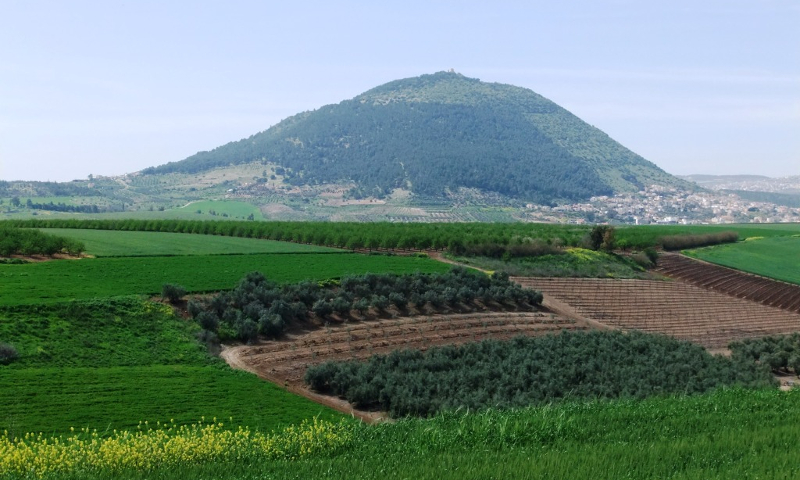I have never been to Israel, but I think it must be a curious place. Because, sometimes when I walk through a place, I feel as if, no matter how alert I am to my surroundings, layers upon layers of meaning and being are surely escaping me. And I suspect that journeying through Israel would be like that on a grand scale.
Take one spot, Mount Tabor. On one level, you have a spectacular monadnock, rearing up from the surrounding countryside. It’s a full-time job just taking in this heap of earth and the view from its top. But in addition to the basic scenery, there’s the fact that you’re in Israel. There’s some serious history here. And then, Israel is the Holy Land. There’s some serious salvation history here. This very mountain is mentioned in the Book of Judges:
“Deborah then said to Barak, ‘Up! This is the day on which the Lord has delivered Sisera into your power. The Lord marches before you.’ So Barak went down Mount Tabor, followed by his ten thousand men” (4:14).
Later in the Bible, it’s the presumed site of a vital Gospel scene:
“After six days Jesus took Peter, James, and John his brother, and led them up a high mountain by themselves. And he was transfigured before them; his face shone like the sun and his clothes became white as light” (Matthew 17:1-2).
And then there would I be, in the midst of all this deafening significance, trudging up a trail of switchbacks, wearing Nike socks and munching on a Cliff bar. The whole land would be like that. Whether you’re taking a dip in the Sea of Galilee or buying a candy bar at an Israeli convenience store, you’re walking on hallowed ground.
Which raises a question. Our God is the God of all heaven and all earth and is present everywhere. God can hear me just as clearly whether I am on Mount Tabor or Mount Rushmore. So why would God make himself out to be closer to Israel than to Philistia or Egypt or Washington, D.C.?
God may indeed be everywhere, but as corporeal beings, we are not. We associate certain places with certain things. Because of this, if we do not have particular places and things and times to associate with God, we begin to feel distant from him, and more readily forget him. In the oft-quoted line from Pixar’s The Incredibles, “If everyone is special, then no one is.” We could adjust that saying to apply here: if God is specially everywhere, he is especially nowhere. But when God does claim certain places as peculiarly his own, far from diminishing his omnipresence, it in fact gives us a greater sense of the intimacy of his presence.
Genesis recounts an anecdote of the patriarch Jacob journeying through Israel as a young man, stopping for the night in Bethel, in the northern Judean hills. That night, the Lord visits him in a dream, and when he wakes, he exclaims, “Truly, the Lord is in this place and I did not know it!” (Genesis 28:16).
Many years later, the Holy Land remains a reminder to the peoples of the world. For us Christians, we know it to be a place hallowed by the footsteps of our Savior. Turning to the Holy Land, whether in thought or in person, we can again and again say like Jacob, “Truly, the Lord is in this place! Truly, the Lord is with us!”
✠
Image: Eli Zahavi, Mount Tabor (CC BY 2.5)







